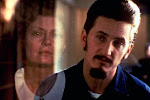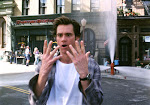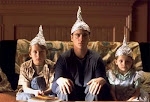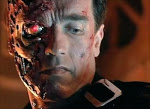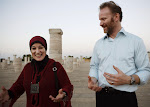 Mel Gibson is a crazy man, which is great. He’s consumed by a vision of either God or religion or a mixture of both.
Mel Gibson is a crazy man, which is great. He’s consumed by a vision of either God or religion or a mixture of both.
First Gibson shocked audiences with the gruesome reality of Christ's crucifixion in The Passion of Christ. Now, in Apocalypto, Gibson uses a similarly shocking portrayal of ancient reality to demonstrate the ugliness of sin.
Mel Gibson utilizes his access to mainstream culture to challenge mainstream thinking. Where public schools teach about evil europeans invading the innocent, peace-loving Native Americans, Gibson portrays the Catholic explorers as the protectors of the innocent. The point is that neither side is completely innocent. In any case I appreciate Gibson’s efforts to shed some positive light on the Catholic Church (not that I’m a proponent of Catholicism).
*** (warning: plot spoiler) ***
The pivotal scene plays out toward the end of the movie, when the main protagonist, Jaguar Paw (Rudy Youngblood) stumbles onto the beach with his last bit of energy, prepared to give up and die at the hands of his bloodthirsty pursuers. This beach would have been Jaguar Paw’s final resting place had not a strange floating craft filled with heavily clothed men floated near the shore. The man in front held a long staff topped with a crucifix. The sight stunned Jaguar paw and his pursuers to the point that they were frozen in their tracks. In this way, the Catholic explorers saved Jaguar Paw. Score one for the Catholic Church before they even stepped foot on North American soil!
The overarching theme of Apocalypto is mankind’s wickedness. Evil doesn’t exist because religious experts saw fit to define it; evil exists because men are inherently evil. Sin wasn’t invented by Christians; it is common to all men. All men have inherited sin no matter what continent people inhabit, no matter how many years they have lived on a continent unaffected by Europeans.
The hub of evil in Apocalypto is the Mayan empire. Looking in from the outside this ancient civilization seems superior to that of the jungle-dwellers. The Mayan society seems more advanced and richer than their jungle-dwelling counterparts. But the Mayans’ fancy façade only veils the rottenness of their hearts and minds. The Mayans show their true colors by forcing thousands of people into slavery, many of which they used for human sacrifice to their gods.
The Bible mentions the blood of Abel crying out from the ground for justice. So also with the Mayans the blood of countless innocent victims cried out to God for justice. This is prophetic for Americans in regards to abortion. God will not allow innocent bloodshed forever. He will eventually step in to strike a balance, even if that means annihilating everything we hold dear.
God will not endure evil forever. He puts up with human strongholds for a time, but inevitably people forget themselves and become excessively rebellious. History reveals a cycle of men rising up because God allowed them to rise until they go too far with their perversions, at which point God either allows them to destroy themselves or He brings in some outside force to wipe them out.
Gibson made a point of showing the spirituality of the Mayans. They were actively giving their minds over their sun god, or whichever gods they were dancing and chanting for. This illustrates that evil people can be spiritually aware however they cannot tell right from wrong because their consciences are too callused.


 I almost regretted renting The Reaping as I carried it over the threshold of my living room.
I almost regretted renting The Reaping as I carried it over the threshold of my living room. 




















